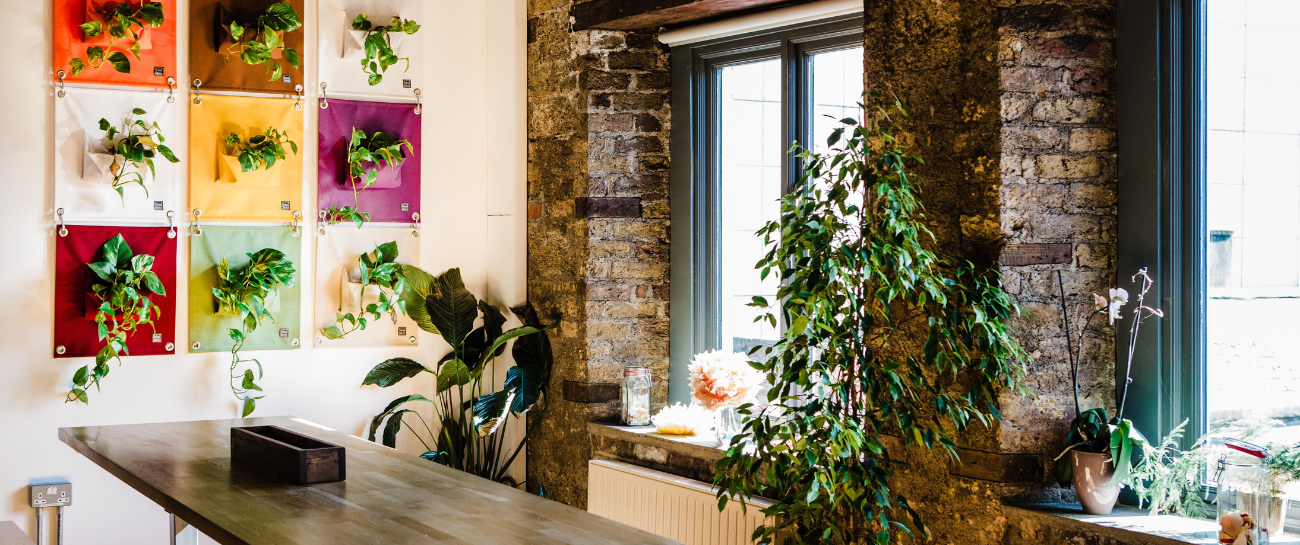
From improving sleep and indoor air quality to helping to reduce anxiety and fatigue, indoor houseplants are powerful allies.
Things are certainly a little stressful around the world at the moment, so as far as we are concerned, it’s all hands on deck in the “boosting wellness” department.
Wellness means something different to everyone. Some of us like to pamper, some unwind with meditation- however, we are strong advocates for the calming abilities of Mother Nature.
With many of us now spending most of our time indoors, plants can provide a welcome escape- bringing life inside our homes.
Here are 5 of our favourite wellness-boosting plants that are perfect for building your very own indoor oasis.

Spider Plant
We like to think of Spider Plants or Chlorophytum as the everyday hero due to their wide range of superpowers!
They’ve been found to remove 95% of formaldehyde in the air, in addition to improving oxygen levels and removing carbon dioxide and nitrogen dioxide.
Spider Plants can also help increase the humidity in the room it's placed in. It absorbs water through its roots and then circulates the moisture through its stems and leaves. Once the water reaches the leaves, it evaporates into the air and increases the humidity. The increased humidity decreases the risk of several airborne diseases, such as cold, cough, sore throat and flu-like symptoms.
The spider plant is named so because of its spider-like leaves, which droop down from the mother plant like spiders on a web. Perfect for those without a green thumb, Spider Plants are among the easiest houseplants to grow.
They enjoy bright, indirect sunlight, watering every 2 weeks and have been known to thrive in almost any setting in your home.

Aloe Vera
The many health benefits of the Aloe Vera plant are no secret.
It is known widely as a medicinal plant and has been used to treat various health conditions for thousands of years.
Aloe Vera plants are excellent air purifiers but actually do most of their work at night while you are sleeping!
Kept in a bedroom, Aloe Vera can also improve humidity levels. It absorbs water through its roots and then circulates the moisture through stems and leaves. Once the water reaches the leaves, it evaporates into the air and increases the humidity. The increased humidity decreases the risk of several airborne diseases, such as cold, cough, sore throat and flu-like symptoms.
And as if that wasn’t enough, this hardworking plant also has healing power in their leaves! The gel contained within the plant is loaded with healing vitamins, antioxidants, and nutrients and can improve and soothe dry skin, burns and acne.
The perfect plant for someone who’s a little nervous about indoor growing, Aloe Vera requires almost no maintenance. They love the sunshine and typically require 6-8 hours of sunlight per day. They cannot tolerate standing in water so make sure there are plenty of drainage holes in your plant container to allow excess water to run out.

Snake Plant
Also known as “Mother-in-Law’s tongue” or Sansevieria trifasciata, Snake Plants are a lovely addition to any room and a useful plant to have in your home.
Snake Plants are beneficial for those with allergies because they add moisture to the air and release ample oxygen, making it easier to breathe.
They also have an air-purifying effect by pulling a wide range of gases—known as volatile organic compounds (VOCs) from the air.
Of all the different oxygen-producing plants, this one is unique since it converts a lot of CO2 (carbon dioxide) to O2 (oxygen) at night, making it ideal to have several in your bedroom.
The durability of Snake Plants makes it an excellent choice for apartment dwellers that often have limited success with houseplants due to lighting issues.
The Snake Plant is well known for coping with direct sun and low light conditions, although bright light conditions with some sunlight and shade are preferred. Be cautious when watering, especially during the winter, better to err on the dry side.

Peace Lily
Also known as Spathiphyllum, the Peace Lily plant is a popular choice as an indoor plant owing to the large amounts of benefits it provides to human health and the amazing touch it gives to the interiors when placed inside.
Renowned for being easy to care for, this shade-loving tropical plant boasts thick, hearty green leaves along with teardrop-shaped white leaves.
According to the research of NASA, this indoor plant has the ability to eliminate 60% of the pollutants like benzene, ammonia, trichloroethylene, xylene, and formaldehyde from the atmosphere. It’s effective at clearing the air of ammonia—found in some cleaning products—as well as other chemicals. They are also known to keep dry environments moister, perfect for upping humidity levels if need be.
It also helps to reduce the levels of mould spores that grow in the home by absorbing those spores through its leaves and them circulating them to the plant’s roots where they are used as food. In bathrooms, the Peace Lily can help to keep shower tiles and curtains free from mildew and the plant can absorb harmful vapours from alcohol and acetone.
However, allergy sufferers, be wary that the flowers do contribute pollen and scent to the air!
A peace lily plant is a wonderful choice as it is low-maintenance and can survive without sunlight in bright indoor light. Put peace lilies in a shady spot and keep the soil moist without overwatering.

Devil's Ivy
NASA classified Devil's Ivy or Pothos as one of the top air-purifiers, reducing Xylene and Carbon Monoxide substances which are found in fireplaces, cooking stoves, clothes dryers, rubber, tobacco smoke, leather and paint.
The Devil’s Ivy is named so because of its rapid rate of growth and needs a lot of carbon to produce new cells. It takes in a lot of air through its leaves, uses the carbon and stores the unwanted chemicals.
According to their study, Devil's Ivy is particularly beneficial to those who suffer from asthma or breathing problems.
Rapid cell growth and increased photosynthesis are like plugging in an air filter in your room. Having Devil's Ivy in your home will reduce airborne mould and air contaminants, which are a major trigger of allergies, asthma and other breathing problems. This affordable plant will help to significantly improve the quality of air in your home and your breathing.
The Devil’s Ivy is probably the most low-maintenance indoor plant in Ireland and these latitudes. It will adapt to the light levels where you place it and its leaves will become more or less variegated.
It has a number of different varieties, Golden Pothos, Marble Queen Pothos, Neon Pothos, Jade and Pearl Pothos. All require minimal water, once every three weeks and love to dry out completely before rewatering.
We'd love to know! What's YOUR favourite indoor plant?
If you enjoyed this blog, why not check out some of our similar posts:
- 3 Powerful Health Benefits of Houseplants
- C'mon, Get A Healthy Happy Home
- 5 Plants For Your Bedroom To Help You Sleep Better






